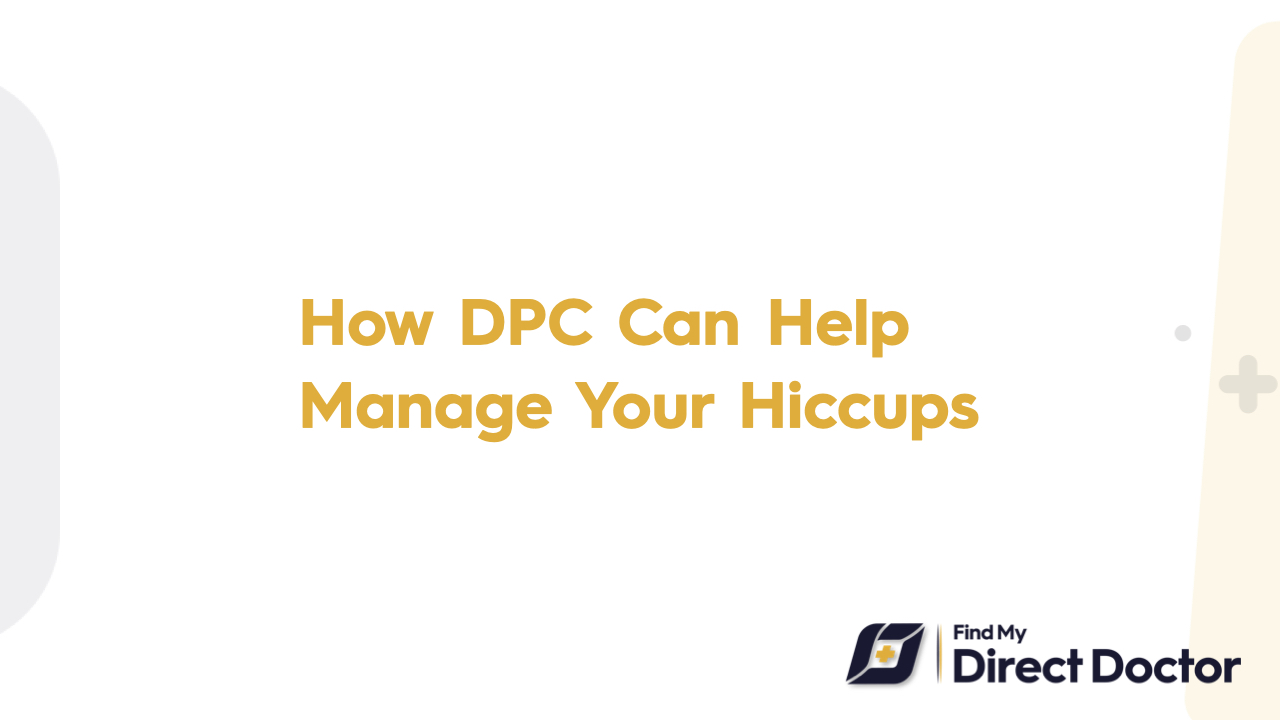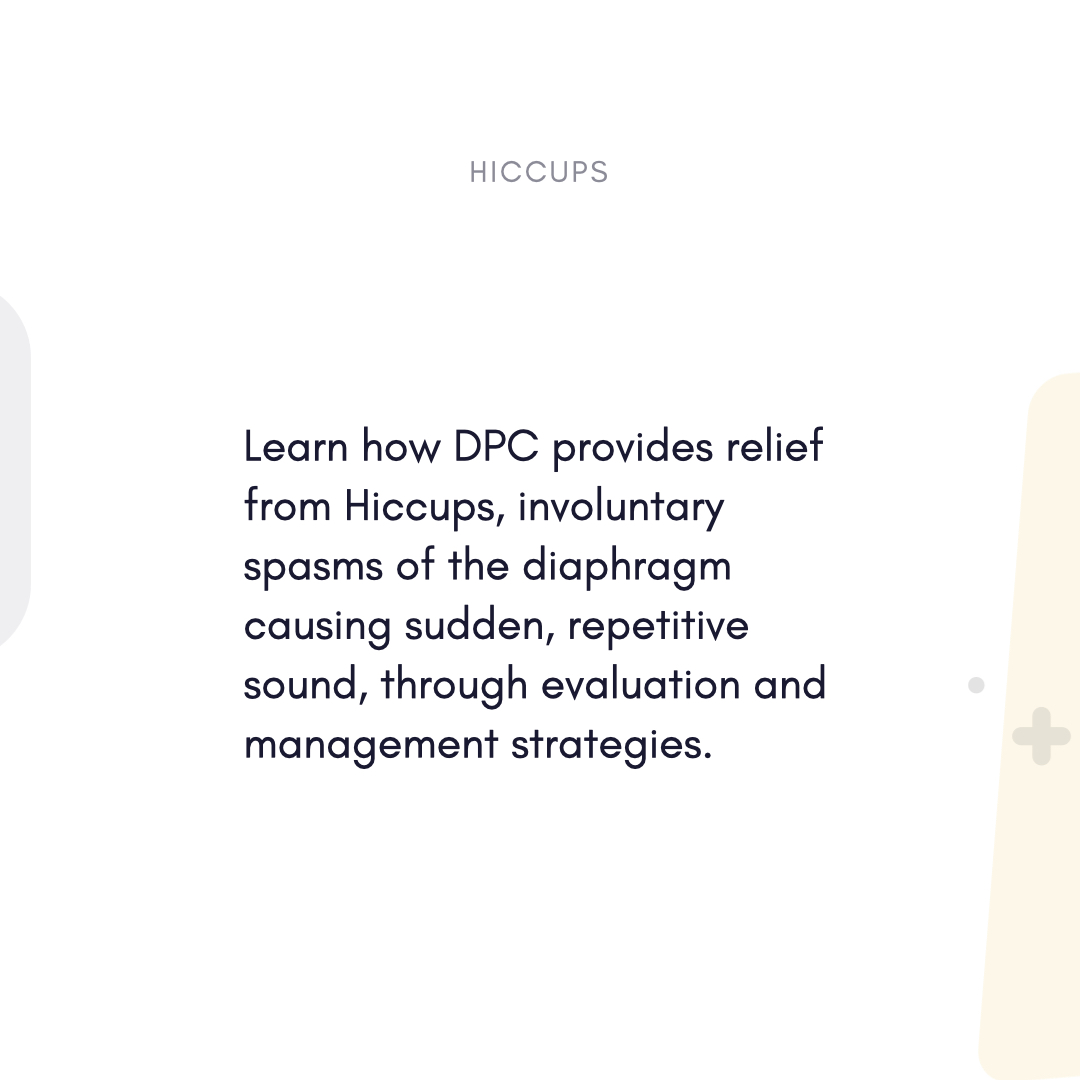Hiccups and Direct Primary Care (DPC): Personalized, Proactive Relief
Usually benign, hiccups—sudden, involuntary diaphragm contraction—can last hours or weeks and point to underlying diseases including GERD, neurological issues, or metabolic abnormalities. Direct Primary Care (DPC) offers fast evaluation, tailored treatments, and perfect specialist coordination—that is, quick fix of problems and target underlying causes—with flat monthly rates and a membership-based approach.

Knowing Hiccups: Their sources
- Acute: Stress; abrupt temperature fluctuations; carbonated beverages; hot foods.
- GERD, nerve irritability (vagus/phrenic), CNS diseases (stroke, tumors), kidney disease, electrolyte abnormalities; chronic/intractable >48 hours.
- Symptoms include: Frequent "hic" sounds, chest discomfort, poor sleep.
- Complications: Dehydration, tiredness, and malnutrition—if prolonged.
How DPC Enhances Problem Management?
1. Quick Evaluation and Diagnosis
- Exams for Same-Day: Use physical/neurological tests to exclude main causes (such GERD or stroke).
- Testing coordinates: Order endoscopy, imaging (brain MRI), kidneys or liver function, electrolytes or blood work.
2. Tailored Approach to Therapy
- Acute Remedies:
- Swallow grains of sugar, guide breath-holding, cold water sips.
- Phrenic nerve stimulation, that is, ice cube intake and carotid massage.
- Medications for cases of chronic/intractable persistence: Either baclofen, gabapentin, or chlorpromazine.
- GERD control calls for: Either PPIs (omeprazole) or H2 blockers (famotidine).
3. Multidisciplinary Coordinating in
- Gastroenterology: For hiccups associated to GERD or diaphragmatic irritability.
- Neurology: Among CNS disorders, brainstem lesions and multiple sclerosis call for different approaches.
- In oncology: Hiccups brought on by chemotherapy or tumours-related nerve compression.
Main benefits of DPC for patients experiencing hiccups
1. Accessibility and Continuum
- 24-hour Telehealth: Treat disruptive hiccup events immediately day or night.
- Regular follow-ups let you adjust treatments based on trigger patterns and improvement.
2. Savings and Cost Openness
- Monthly Rates (USD 50–USD 100): Flat Fees Cover exams, basic labs, and care coordination—no hidden costs.
- Early intervention will help to stop costly ER trips.
- Holistic, patient-centered treatment:
- Apps for customized changes track dietary, stress, or medication triggers.
- Suggest hydration, smaller meals, yoga and meditation to help with stress from your lifestyle.
Individualized Hiccup Management in DPC
1. Inclusive Testing All-Around
- Study of Root Causes: Investigate GERD, diabetes, uremia, side effects from medications (including steroids, anesthesia).
- Examining steps-wise: Start with basic labs (electrolytes, creatinine), then, should problems develop, move to MRI or endoscopy.
2. Individualized Treatments
- Pharmaceutical:
- First-line: baclofen (muscle relaxant) or gabapentin, a nerve modulator.
- Refractory response cases: Chlorpromazine, antipsychotic with anti-hiccup action.
- Non-pharmacological: Acupuncture, diaphragmatic breathing exercises, or vagal nerve stimulation.
3. High Risk Communities
- Patients Following Operational Guidelines: Correct issues brought on by anesthesia or abdominal surgery.
- Work with oncologists to handle chemotherapy-related hiccups in cancer patients.
Real-World Results
- Maria's DPC provider, Endoscopy, discovered GERD as the underlying cause after weeks of erratic disturbances to her sleep.
- Prescribed omeprazole and baclofen to get 48-hour hiccups gone.
- Worked with a gastroenterologist under long-term reflux control.
- These days Maria uses a trigger diary to help avoid flare-ups.
FAQs: Mistakes and DPC
- Q: Should hiccups demand medical attention?
A: If they span more than 48 hours, disrupt sleep or eating, or accompany neurological or chest issues.
- Q: Can drugs for hiccups be addictive?
A: No; DPC uses non-habit-forming drugs like baclofen and watches for side effects.
- Q: Can stress lead to ongoing hiccups?
A: Obviously. DPC calls for stress management and therapeutic mindfulness into treatment schedules.
- Q: Are glitches suggestive of cancer?
A: Rarely—DPC searches refractory cases for tumors compressing nerves.
Why DPC Shines in the Hiccup Care Guide?
- Having equipped: Based on stepwise recommendations published by American Academy of Family Physicians (AAFP).
- Arranging several disciplines: She skillfully cooperatively works with neurologists, GIs, and oncologists in challenging cases.
- For long-term relief: Teaches self-care techniques including breathing exercises, trigger tracking.
- Cost transparency: For diagnostics, medications, and specialist referrals.
How DPC Specifically Supports Timely Interventions for Hiccup Patients
- Rapid access to treatments and diagnostics helps to prevent side effects including dehydration.
- Combining drugs, changes in lifestyle, and professional advice produces whole answers.
- Long-term relationships allow providers to dynamically alter treatment and track trends.
Silence Ripples Quick using DPC
Let mistakes not define your life. With DPC, look for a partner who offers customized, evidence-based treatment to rapidly address issues and target latent triggers for long-term healing.






